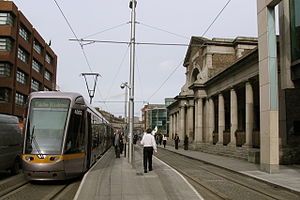Harcourt Street
| Harcourt Street line | |||||||||||||||||||||||||||||||||||||||||||||||||||||||||||||||||||||||||||||||||||||||||||||||||
|---|---|---|---|---|---|---|---|---|---|---|---|---|---|---|---|---|---|---|---|---|---|---|---|---|---|---|---|---|---|---|---|---|---|---|---|---|---|---|---|---|---|---|---|---|---|---|---|---|---|---|---|---|---|---|---|---|---|---|---|---|---|---|---|---|---|---|---|---|---|---|---|---|---|---|---|---|---|---|---|---|---|---|---|---|---|---|---|---|---|---|---|---|---|---|---|---|---|

Harcourt Street terminus on the right, by George Wilkinson, 1858-59.
|
|||||||||||||||||||||||||||||||||||||||||||||||||||||||||||||||||||||||||||||||||||||||||||||||||
| Overview | |||||||||||||||||||||||||||||||||||||||||||||||||||||||||||||||||||||||||||||||||||||||||||||||||
| Type |
Commuter rail, Inter-city rail Heavy rail |
||||||||||||||||||||||||||||||||||||||||||||||||||||||||||||||||||||||||||||||||||||||||||||||||
| System | CIÉ Railways Division | ||||||||||||||||||||||||||||||||||||||||||||||||||||||||||||||||||||||||||||||||||||||||||||||||
| Status | Not in use | ||||||||||||||||||||||||||||||||||||||||||||||||||||||||||||||||||||||||||||||||||||||||||||||||
| Locale | Ireland | ||||||||||||||||||||||||||||||||||||||||||||||||||||||||||||||||||||||||||||||||||||||||||||||||
| Termini |
Harcourt Street Bray Daly |
||||||||||||||||||||||||||||||||||||||||||||||||||||||||||||||||||||||||||||||||||||||||||||||||
| Stations | 10 | ||||||||||||||||||||||||||||||||||||||||||||||||||||||||||||||||||||||||||||||||||||||||||||||||
| Operation | |||||||||||||||||||||||||||||||||||||||||||||||||||||||||||||||||||||||||||||||||||||||||||||||||
| Opened | 10 July 1854 | ||||||||||||||||||||||||||||||||||||||||||||||||||||||||||||||||||||||||||||||||||||||||||||||||
| Closed | 31 December 1958 | ||||||||||||||||||||||||||||||||||||||||||||||||||||||||||||||||||||||||||||||||||||||||||||||||
| Owner | CIÉ Railways Division | ||||||||||||||||||||||||||||||||||||||||||||||||||||||||||||||||||||||||||||||||||||||||||||||||
| Operator(s) | CIÉ Railways Division | ||||||||||||||||||||||||||||||||||||||||||||||||||||||||||||||||||||||||||||||||||||||||||||||||
| Character | Tertiary | ||||||||||||||||||||||||||||||||||||||||||||||||||||||||||||||||||||||||||||||||||||||||||||||||
| Rolling stock | CIÉ 2600 Class | ||||||||||||||||||||||||||||||||||||||||||||||||||||||||||||||||||||||||||||||||||||||||||||||||
| Technical | |||||||||||||||||||||||||||||||||||||||||||||||||||||||||||||||||||||||||||||||||||||||||||||||||
| Line length | 12.5-mile (20 km) | ||||||||||||||||||||||||||||||||||||||||||||||||||||||||||||||||||||||||||||||||||||||||||||||||
| Number of tracks | Double track | ||||||||||||||||||||||||||||||||||||||||||||||||||||||||||||||||||||||||||||||||||||||||||||||||
| Track gauge | 1,600 mm (5 ft 3 in) Irish gauge | ||||||||||||||||||||||||||||||||||||||||||||||||||||||||||||||||||||||||||||||||||||||||||||||||
| Electrification | Not electrified | ||||||||||||||||||||||||||||||||||||||||||||||||||||||||||||||||||||||||||||||||||||||||||||||||
|
|||||||||||||||||||||||||||||||||||||||||||||||||||||||||||||||||||||||||||||||||||||||||||||||||
The Harcourt Street railway line (Irish: Seanlíne Iarnróid Shráid Fhearchair) ran from Harcourt Street in Dublin through the southern suburbs to Bray.
Following the success of the Dublin and Kingstown Railway (D&KR), which opened on 17 December 1834, proposals for a second commuter railway were put forward. These plans proposed the building of a 12.5-mile (20 km) railway from Bray Daly, which opened on 10 July 1854 to initially terminate at Harcourt Road. (Harcourt Street Station was not built until 1859). The building of the line was done by two railway companies: The Dublin, Wicklow and Wexford Railway (DW&WR), who built the line from Dundrum to Bray and the Dublin, Dundrum and Rathfarnham Railway (DD&RR), who were to build the line from Harcourt Street to Dundrum. The latter failed to do so, and the 'Dublin & Wicklow Railway' took over the line works.
On 14 February 1900, a train from Enniscorthy failed to stop and went through the buffers and the wall of the station, sending debris over Hatch Street. Nobody was killed, though the driver, William Hyland, had his right arm amputated at the scene. Another serious accident occurred on 23 December 1957 when two trains collided in thick fog just south of Dundrum station. The first train had slowed to a walking pace because of a cow on the line. The second train was allowed into the same section of a track due to an error by a signalman. Its driving cab was completely destroyed in the collision and the driver, Andrew Larkin, was killed instantly.
In the 1950s, diesel gradually replaced steam in an effort to improve journey times as many passengers had by then forsaken the line due to a rapid and significant increase in private car ownership. CIE were also rapidly expanding their then new bus services in and around the railway.
The 12.5-mile (20 km) route ran south, initially from a temporary terminus on Harcourt Road, serving the intermediate stations of Dundrum, Stillorgan, Carrickmines and Shankill. The new Harcourt Street station, still extant, opened on 7 February 1859, along with a temporary platform at Foxrock.
Further new stations followed; Milltown (1860), Foxrock (1861), Rathmines & Ranelagh (1896, renamed Ranelagh in 1921). It joined the Westland Row line at Shanganagh Junction continuing to Woodbrook Halt (1910), which served the cricket ground on Sir Stanley Cochrane's estate. The Woodbrook Golf Club and Cricket Grounds later used this halt between 1920 and 1960. In October 2015, it was proposed to reopen Woodbrook as a station on the DART line between Shankill and Bray.
...
Wikipedia
